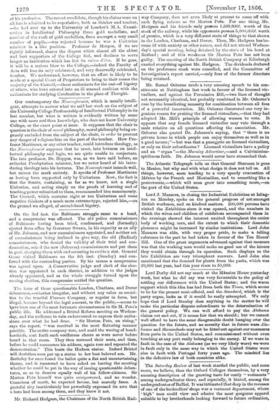The issue of those questionable London, Chatham, and Dover' debentures,—whether
irregular, and without any value as securi- ties to the trustful Finance Company, or regular in ferns, but illegal, because beyond the legal amount, to the public,—seems to have been one of the most fortunate circumstances in Sir M. Peto's public life. He addressed a Bristol Reform meeting on Wednes- day, and the audience in vain endeavoured to express their enthu- siasm over what he had done. "Sir Morton Pete, on rising," says the report, "was received in the most flattering manner possible. The entire company rose, and amid the waving of hand- kerchiefs, sent forth such vociferous cheers as were never before heard in -that room. They then renamed their seats, and then, before he could commence his address, again rose and repeated the demonstration." This beats the Hudson statue. Indeed Bristol will doubtless soon put up a statue to her best beloved son. Mr. Berkeley for once found the ballot quite a flat and unentertaining, theme, and is rumoured to have asked on leaving the meeting whether he could be put in the way of issuing questionable deben- tures, so as to deserve equally well of his fellow-citizens. Sir Morton Pete himself was quite overpowered, and no wonder. Conscious of merit, he expected favour, but scarcely fame. A grateful city inarticulately but powerfully expressed its awe that a hero had been among them, and they knew it not.






























 Previous page
Previous page